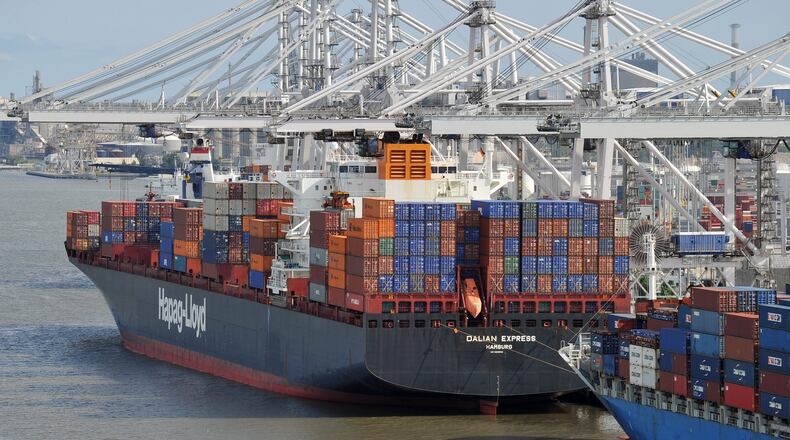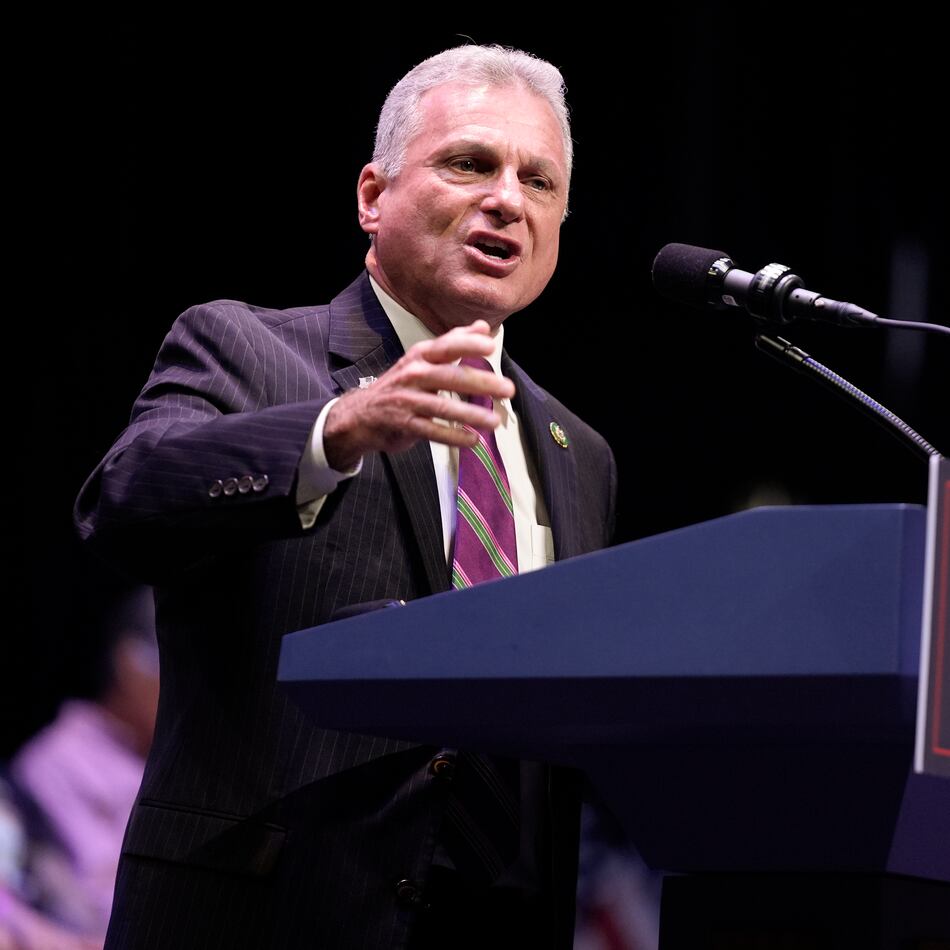As president, Donald Trump has promised more aggressive use of tariffs to bring trade partners and economic competitors to heel — and as a cudgel, supporters say, to bring jobs back to the United States.
Tariffs are taxes on imported goods. These typically are costs that are passed along by businesses to buyers of products, whether that buyer is a manufacturer obtaining parts that go into something bigger, such as an automobile, or a regular consumer shopping in a store or on Amazon.
Economists generally view tariffs as inflationary, and the cost of living and inflation were the top issue among voters polled this month by The Atlanta Journal-Constitution.
Trump used tariffs repeatedly during his first term in office and some countries, like China, fought back. In the run up to his inauguration on Monday, he has floated across-the-board tariffs on imports from all countries and steeper import taxes against neighbors Canada and Mexico, as well as China.
“I think nearly all economists, at least those who aren’t joining this administration, would say … that tariffs, particularly ones as steep as 25% on our biggest trading partners, are very damaging to our own economy,” Associated General Contractors of America Chief Economist Ken Simonson said in a recent media briefing. “They’re going to drive up prices, not just on the imported items themselves, but I think contractors here would confirm that they saw prices rise from domestic suppliers also.”
The U.S. is the largest importer of goods in the world, and such tariffs, if implemented, would likely raise prices on things like automobiles and food produced in Mexico and Canada; clothes, toys and electronics made in China; and other goods.
Trump has claimed revenue created by tariffs could help fight the deficit and pay for other priorities. Experts say the tariff threat also could be a negotiating ploy for certain policy aims.
What are tariffs and who pays them?
A tariff is a tax on goods crossing a border. It is paid by whatever company or person is bringing in the goods.
Since it adds to the importers’ price, they typically tack it onto the price tag for the company or consumer.
Have other presidents enacted tariffs?
Yes. Though the U.S. has moved toward freer trade in recent decades, tariffs have been used for centuries and quite recently.
President Joe Biden in May raised tariffs to protect American electric vehicle and solar panel industries from cheap Chinese imports, ramping up an ongoing trade war between the two global superpowers that could impact Georgia’s burgeoning clean tech sector. He also hiked tariffs on Chinese steel, aluminum, ship-to-shore cranes, some medical products and certain critical minerals.
Biden also kept in place many of the tariffs enacted against China during Trump’s first term.
Can the president enact or alter tariffs unilaterally?
For the most part, yes. Congress has largely ceded tariffs to presidents since the 1930s. However, Trump’s proposed tariffs against Canada and Mexico could come under legal challenge. During Trump’s first term, the U.S., Canada and Mexico came to terms on a reworked trade agreement that new tariffs could violate.
The Department of Commerce and U.S. Trade Representative generally implement tariffs for the administration. Trump recently said he would create an “External Revenue Service,” an agency to collect import taxes, even though U.S. Customs and Border Protection currently collects the duties.
How do Georgians feel about Trump’s proposed tariffs?
This month’s AJC poll found 49% of respondents are somewhat or strongly opposed to Trump’s proposed tariffs, compared to 42% who strongly or somewhat support Trump’s plans. About two-thirds of those polled believe new taxes on imports will raise costs.
The poll of 1,000 registered Georgia voters was conducted Jan. 2-10 by the University of Georgia’s School of Public and International Affairs with a margin of error of plus or minus 3.1%.
Among Republican respondents, 38% said they thought tariffs would increase the price of goods, compared to 71% of independent voters and 92% of Democrats.
The majority of those surveyed, 56%, said they still expect the economy to improve during the next 12 months, Trump’s first year in office.
What are the potential upsides of a tariff?
Trump has cast tariffs as retaliation from unfair trade deals that have decimated American manufacturing.
The taxes make imports more expensive. So, tariffs can prevent some importers from undercutting U.S.-made products. With enough time, tariffs can provide an incentive for U.S. manufacturers to expand their production and for foreign manufacturers to build plants in the U.S.
Tariffs during Trump’s first term against all foreign makers of washing machines eventually created U.S. jobs, although consumers paid more for the machines.
What are the potential downsides of tariffs?
They nearly always raise prices for U.S. companies and consumers.
And because U.S. factories may not be able to expand quickly enough if the import taxes price out foreign goods, tariffs may cause shortages, experts say. Moreover, they often hurt other U.S. manufacturers, since many factories have to import parts used in production.
Sina Golara, an assistant professor at Georgia State University’s Robinson College of Business, said he thinks addressing U.S. dependence on China as a trade partner is a worthwhile mission, but doing it with tariffs will be hard to execute without causing economic pain at home.
“It’s good to wean off that but if you want to do it all at once, like with the tariff, you’d have to tolerate the inflation,” Golara said.
Credit: Jason Getz / Jason.Getz@ajc.com
Credit: Jason Getz / Jason.Getz@ajc.com
It’s unclear what tariffs the Trump administration will implement, but Golara estimates the proposed taxes on Chinese goods alone could cost American importers $200 billion to $300 billion.
“It will leave them (companies) with no other choice than to raise prices,” Golara said.
Tariffs could have other knock-on effects, too.
Trump’s proposals would likely strengthen the U.S. dollar, Golara said. Appreciation could be good for some pockets of the U.S. economy but would shrink the buying power of other countries and likely depress global trade. That, he said, would hurt international economies and “might actually help trigger a recession globally.”
Tariffs by one country also don’t just happen in a vacuum. Other countries retaliate.
Golara cowrote a study published in the Journal of Purchasing and Supply Management last year saying levies can produce temporary benefits but that the long-term impact on the flow of products globally is often misunderstood.
Looking at tariffs in the 2018 U.S.-China trade war during Trump’s first term, the study said: “In addition to hurting firms in the protected industries, retaliatory Chinese counter-tariffs also hurt non-protected U.S. firms, particularly those in the agricultural industry.”
How are businesses responding to the tariff threat?
Some manufacturers are stockpiling inventories in anticipation of higher tariffs, and there’s potential for tariffs to drive prices higher, according to the Federal Reserve’s Beige Book released last week.
The Federal Reserve Bank of Atlanta said firms in its district “pointed to diversified supply chains as a potential buffer to proposed tariffs.” The Atlanta Fed’s survey on business inflation expectations in the manufacturing sector found that some firms saw improved demand, but concerns over tariffs were among the risks to the outlook.
Margaret Muhammad, president and CEO of the Georgia Black Constructors Association, said the uncertainty about trade policies discourages investment overall, “which in turn will limit construction projects and contract opportunities.”
Her association will hold a symposium in downtown Atlanta later this month, with Trump’s policies expected to be a topic of discussion, including how her members will be affected.
“It’s just everybody being on edge because we don’t know what’s going to happen,” Muhammad said.
— Staff writers Mirtha Donastorg, Zachary Hansen and Michael E. Kanell contributed to this report.
Keep Reading
The Latest
Featured





